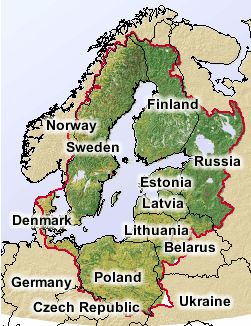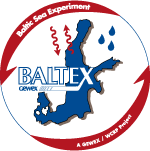|
|
 Research for the Baltic Sea catchment basin Research for the Baltic Sea catchment basin
The Baltic Sea catchment basin
The Baltic Sea catchment basin (or in short "Baltic Sea basin") is defined by the land area from which all precipitation (rain and snow) falling on land, will flow into the Baltic Sea (if it does not evaporate back into the atmosphere or is retained in ground water or lakes). The catchment basin can be seen as a big bowl, with the Baltic Sea in the centre (see figure on the right). The catchment basin must not be confused with the different basins of the Baltic Sea itself, which shape the bottom topography of the sea floor.
Investigating water, energy and matter cycles under a changing climate
- The water and energy cycle and its processes are fundamental for weather and climate phenomena. Will there there be more or less rain or snow in the future, and where? Questions like this are tackled by scientists analyzing the water and energy cycle of the Baltic Sea drainage basin. More...
- How will regional climate change in the future and what are the effects of climate change on the Baltic Sea basin? Looking at the region is crucial when we try to estimate the local consequences and possible adaptation measures. More...
- As climate changes, so does the amount of rainfall and river runoff. Extreme events like floods and droughts may be more frequent in future, and we need to be prepared. More...
- Water as the Earth´s ubiquitous solvent carries basic life-supporting elements such as carbon, nitrogen, phosphorus, sulphur, oxygen, as well as trace elements, and governs their fluxes and reservoirs on land, in the sea and the atmosphere. These may be drastically changed in the future, and we need to find out how, and what the consequences for the organisms and ecosystems of the Baltic Sea drainage basin are. More...
|
|
What is BALTEX?
BALTEX is an international research programme in which scientists from all countries surrounding the Baltic Sea have come together to investigate the water and energy cycle in the regional climate system of the Baltic Sea catchment basin together with related hydrological and biogeochemical processes, as they change with climate. This includes processes in the atmosphere, the land surface including rivers and lakes, and the Baltic Sea itself. Scientists contributing to BALTEX research come from diverse research fields like meteorology, hydrology, oceanography, climatology and biogeochemistry. Thus, BALTEX tries to integrate the different research disciplines to arrive at a holistic description of the Baltic Sea basin environment.
BALTEX constitutes a network of scientists and institutions, including national water management and weather services. Under the umbrella of the World Climate Research Programme of the United Nations, it is also part of a worldwide network of similar research programmes in other drainage basins, for example the Amazonas in South America, or the McKenzie in Canada. Among the 8 so-called Regional Hydroclimate Projects, BALTEX is special as it is the only participating programme which has an intracontinental (sourrounded by land) sea in its drainage area. In this sense, the Baltic Sea can be treated as a giant lake in the basin, which drains into the Atlantic trough the danish straits (the belts and sounds), which represent the “river mouth” or “delta” of the Baltic Sea drainage basin.
|
|
|

|
|
|
|
Research News
|
The climate of the Baltic Sea basin shows high variability over the past 500 years
... more |
Modelling Baltic Sea water temperatures and ice extent over the past 500 years
... more |
BACC book published: BALTEX scientists have compiled the current knowledge on climate change in the Baltic Sea Basin
... more |
|
| This web site is addressed to the interested public and has been established to translate scientific findings and background information into a comprehensive language. The web site is being established by the International BALTEX Secretariat at

|
|

